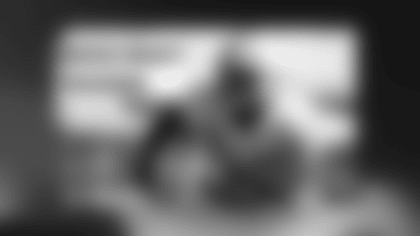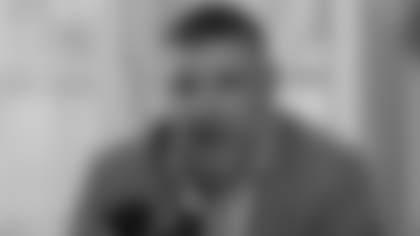PATRIOTS HEAD COACH BILL BELICHICK
Q: How do you judge the effectiveness of a zero blitz, which leaves no safety over the top to help in coverage? It seemed to work earlier in the game with Devin McCourty blitzing, but then allowed for a 51-yard pass completion later in the game. How do you evaluate the effectiveness of blitzing when you review it on film?
BB: Yeah, I think it's just part of trying to keep the offense off-balance and not doing the same thing. If we did it well then we reinforce it, and if we didn't do it well then we try to correct the mistakes and do it better the next time.
Q: How much of that is disguise and a credit to Devin for disguising that blitz until the last second?
BB: Yeah, there's certainly a merit to that. Yeah, sometimes you want to try to disguise it. Sometimes it might be better just to not be too far away so that it doesn't take quite as long to get there, but you don't want the quarterback to see it. You just try to find the right balance there, the best way to execute it. It's hard against [Aaron] Rodgers no matter what you do, whether you blitz or don't blitz, play zone or play man. He's seen it all and he can certainly handle it all. I don't think you're going to fool him. You just try to keep him of-balance and hope you can make a play somewhere along the line. It was a great throw, great catch on the pass to [Marquez] Valdes-Scantling there in the third quarter, the start of the third quarter. A good play by the Packers.
Q: How close did you come to challenging the attempted catch by Josh Gordon on the opposite sideline from you? Was that a similar situation to what we talked about in the Chicago game with the Edelman reception that was ruled incomplete? Would it have not been worth it given the time and place in the game?
BB: I think it probably would've been worth it if he was in-bounds, but the second foot had to be in. It was a quick look. It looked like the officials made a good call on that play, but I don't know. It was a quick look at it so we didn't, obviously, go through the whole process.
Q: What do you remember about your time with Mike Vrabel that would've led you to believe he could definitely become a head coach someday?
BB: Well, I'm very fortunate to have had a great relationship with Mike through the years when he played and then when he stopped playing and went into coaching, starting at Ohio State and continued on to the Texans and now in Tennessee. Mike has a lot of great qualities as a person and that translates into being a good coach, but he works hard. He's physically very tough and has a great passion for the game. I think you saw that in his playing, saw it in his coaching and has a lot of experience. He's very astute and picks things up quickly. He works hard, but has a good aptitude for football. I think the game comes fairly easily to him in terms of understanding concepts and situations and things like that. He was a great player here, one that hopefully will be recognized into the Patriots Hall of Fame. I certainly think he deserves to be there. He's got a great coaching career. He's already established it but continues to build on it. Yeah, he's one of the best; the best we've ever had.
Q: How pleased were you with the effort of your defense versus Davante Adams? In particular, what did you see from Stephon Gilmore when he was assigned to Adams?
BB: Yeah, I thought Stephon did a real good job on him. It's tough. He's an excellent receiver. He does a lot of things well. We doubled him a decent amount of the time, too, as well as played some zone. But he's a great receiver with a great quarterback and a great offensive system. It's hard to stop. I don't think you're going to stop him. You just try to slow him down and keep him from killing you. I thought Gilmore played him very well, played him with good technique. A couple of the catches that he made we tackled him pretty quickly after the catch out in the flat there. Duron [Harmon] got him I think late in the game immediately after the catch, so if he gets the ball you've got to try and get him on the ground so it doesn't extend and he's a very good runner after the catch, or keep him from getting the ball.
Q: How good has James Develin been in the run game this year and how important has he been to that facet of the offense this season?
BB: Well, James always brings a positive element to our team, both offensively and in the kicking game. He's a very intelligent player with quite a bit of experience in our system and he can do a lot of different things from pass protection to the running game. As a fullback playing behind the line of scrimmage, that player is often, and almost always, called on to make adjustments based on what happens in front of him. Sometimes it goes the way kind of it's supposed to go, but a lot of times those guys move and space opens up or closes up, and then the player behind is the running back of course, but the fullback in front of the running back has to recognize and make those adjustments, make the right adjustment as well as having to block a good player - a linebacker or a stunting defensive lineman or whoever the assignment is, however it unfolds. He has to make that decision and then make a solid block, and then the running back has to depend on that block and make his cut off of it. James' play on offense in the running game and the passing game and then his play in the kicking game has been very dependable for us, and his role is a very solid role that sometimes expands or could shrink a little bit depending on game situations and so forth. But he's always dependable. We can always count on him, whatever it is. He does a great job.
Q: Between Cordarrelle Patterson, Matthew Slater and others who were asked to play a little bit out of position, what does it say about a player when he's willing to contribute in ways outside of his normal role?
BB: Well, I'll just say, Phil [Perry], in all my years of coaching, and I guess unfortunately it's been quite a few, but it would be very rare - there's so few examples of it being any way but that, that that's just the way it is. Look, players want to play, players want to help their team, players want an opportunity to contribute, and we all know that you have to do some things maybe that are secondary or third or fourth on the list, at times, in order to do the things that you want to do. Receivers have got to block in order to catch the ball and backs have to pass protect instead of being able to run the ball. But, you can't carry the ball on every play anyway, so I mean, those things are part of the job. I've been very fortunate, I guess, to have players that they're all kind of like that. They want to help the team, they want to do whatever they can do, whatever you ask them to do, whether it's change role on offense, defense or in the kicking game, but they want to contribute to the team and they want to help in a way. A lot of times, by helping somebody else, it helps themselves, and then there's certainly plenty of other plays where other people do the same thing for them. So, I mean, it's great, but I think it's pretty common on the teams that I've been on, the world that I live in, that that's the way it is. If you ask a guy to do something, he doesn't come back and say, 'Well, I don't really feel like doing that.' I mean, that just really doesn't happen.
Q: I know you addressed the Salute to Service proceedings yesterday, but I noticed that generally you haven't worn the Salute to Service gear that a lot of the coaches wear. Obviously, yesterday you had the buttons and the decals. So, I wondered why you choose to not wear the NFL gear but instead have a more personal approach or go your own route with it?
BB: I mean, I don't know. I mean, I usually wear the same thing for every game - I mean, not the same thing, but depending on the weather and so forth, I just wear the same thing for every game. So, I don't change what I wear weekly based on whatever the theme of the week is. But, Salute to Service is - look, the military and the job that our servicemen and women do and the sacrifices that they make are very important to me and my family, always has been, always will be, and I always want to recognize those and I do it. So, I don't have any objection to what anybody else does, but I just choose to - honestly, I don't think what sweatshirt I wear is that important. What's important to me is what your actions are, what you do, so I try to make those count.
Q: After the game, a lot of the defensive players were crediting the safeties with disguising coverages and blitzes. How much of that would you say is game-plan specific and how much of it is what you guys try to do every week?
BB: Well, yeah, I think the safeties did a great job of it, and I think it could be more or less important from week-to-week, depending on different circumstances and different things that involve your opponent and your specific game plan for them. So, it's always a fine line, and that's why experience at that position is so important. Disguising is good and you want to try to do it, but you have to be in position to handle your responsibility. So, disguising at the expense of being out of position and not being able to make the plays that you need to make or be where you need to be, that's a bad thing. So, the good thing is disguising, but the bad thing is being out of position, so you have to try to balance those. Again, that comes with experience from Devin [McCourty] and Duron [Harmon] and Pat [Chung] knowing where they need to be, what they need to do, how much risk or how far away they can be from that responsibility and make it look like they're doing something else that they would normally do and trying to tie different calls in based on the formations, because we have no control over the formation the offense comes out in. We don't know where they're going to be when we make a call, so once they align, then the variables on disguise change quite a bit. Of course, if the safeties - with experienced safeties like we're fortunate to have - can work together and complement each other as part of the disguise, then that's a good thing, too. But, it's a fine line and it's, I'd say, a very individualized thing between the player or players and the formation, the situation and the people that we're playing against and what they do. So, it's kind of a, I don't want to say a trick subject, but it takes some understanding and experience. And, you know, that also extends to the linebackers and [Dont'a] Hightower, [Kyle] Van Noy and guys that play at that spot to a lesser degree, but maybe on an equal level of doing that with the line, the line of scrimmage, the backs, the quarterbacks - trying to affect them to get them as much as they can, depending on a lot of variables that could change from play to play.
Q: How much freedom do you give experienced players like Devin, Patrick and Duron to kind of disguise things themselves and not have it be something necessarily that the coaches are enforcing?
BB: Yeah, well, with the safeties and Steve [Belichick] goes over that with them every week, and the linebackers, DeMarcus [Covington] and B-Flo [Brian Flores] go over that with them, as well. So, I mean, look, we put a lot of trust in those guys and they're the ones that are on the field. Again, when you make a call from the sideline, they're the ones that are playing the game and they see and can recognize things a lot better than a coach can because they're actually out there doing it and they get a later look at it than the coach does when he makes the call. So, you know, we give them certain parameters, but in the end, all the decisions that they make out there are their decisions and we trust them to make good ones and make the right ones. We never want to put them in a compromising position. Again, the execution of the plays is more important than the disguise. But, we've had a lot of players through the years, going back to particularly Rodney [Harrison] and guys that - Devin of course, Pat - those guys have been here a long time - Duron, too, for that matter. But, they've really been good at that, and that's helpful to the entire defense.
Q: I wanted to ask you about the flea-flicker. Two things stuck out to me with the timing of the play - James White getting into the line, actually taking a step to his left before pitching it back to Tom Brady and Tom's window to find Julian Edelman downfield and how he threw it to him right away. The way that play was executed, did anything stand out to you?
BB: I mean, that play is a play that really takes great timing and execution. It's a hard play to execute on a lot of levels and it's a little - there's some risk to it, obviously. The idea, of course, is to suck the defense up, in or towards the line of scrimmage and then be able to get somebody behind them, either behind the secondary or behind the linebackers. In this case it was behind the linebackers. You always count on the running back to make the right decision so you never want to pitch the ball back if there's going to be a problem with the pitch back and now the quarterback's getting the ball and somebody's on him and there's a lot of things that could go wrong there. But, you know, James made a great decision. It was a tough one too, because when he had the ball, [Nick] Perry was up the field and he had a good sense and a good feel that he was blocked, wasn't really close to Tom. But it's a lot easier when the line of scrimmage is flat and there's kind of no penetration, then it's kind of easy to pitch the ball back and you know that the quarterback's safe. When you pitch it back and there's a defender behind you where you're pitching it and you have to kind of count on that guy being blocked, it's a tougher decision for the back. But James saw it, he made a good one, Trent [Brown] was in good position, Joe [Thuney] was in good position to block on the play. We were able to get it cleanly executed but it was a tough play to execute. And then of course the receivers, Julian [Edelman] and [Chris] Hogan can't - they don't want to go too fast or the defense will recognize it, they have to make it look like it's a running play and block and hesitate there for a little bit so that the timing of the play works out but also they don't give it away and it really appears to everybody that it's a running play and then it turns into a pass play. It was very well-executed by James, by Tom, by Julian and by the offensive line as a total group to sell the run but still be in position to pass-block and then to give the play an opportunity - everybody an opportunity to handle the ball. I thought that Dwayne Allen made a good play on that too where [Jaire] Alexander blitzed and he - not Alexander -
Q: Reggie Gilbert I think.
BB: Yes, right. He blitzed and crossed his face and Dwayne had to flatten him out and gave James a clean chance to get the ball back there so it was - a lot of little things on that play, a lot of things that can go wrong, but if it works, then there's an opportunity for a bigger reward. There's a lot of moving parts to that. But again, so you really want guys that are experienced at making the pitch, handling the ball, running the route. You put a lot on those guys and they did a good job.
Q: I wanted to ask you about the sack that came around the nine minute mark of the fourth quarter. I know last night you talked about the pass rush and how difficult it is to get to Aaron Rodgers. But it looked like Trey Flowers and Adrian Clayborn ran a game up front and both got to the quarterback. With that play in particular, is it a stretch to say that the timing and execution of a play like that in Week 9 really goes back to the work they've invested all season and even back in the preseason noting just how much extra time those guys would spend on technique before and after practices? And then beyond that, in terms of Trey Flowers' continued development, how much of that is a testament to all that extra time that he's invested in what he does?
BB: Trey works extremely hard, as we know. He's one of the hardest working guys on the team - running game, passing game, his physical development and maintenance in terms of getting treatment and taking care of himself. You know, a lot of times he's playing inside, which he did quite a bit of last night. At his size, he's just lighter than a lot of guys that play in there over the guard and that position. So he does a good job of again, week-to-week, physically taking care of himself, being able to hold up and the techniques of playing inside, playing outside, playing on the open side, playing on the tight end side. He's a very versatile and valuable player for us. So on that play - I mean, first of all, start off with good coverage on the play. Really no receiver came open right away and we were able to have pretty good coverage on the play. But the rush got there quickly and Trey and Adrian did an excellent job on the twist game there on the defensive right side that came clean. One of the tools in the box for the defensive linemen, their different individual pass-rush techniques and then there are ways to run games and twist and so forth to try to stress the protection. It's just something that the players really had talked about prior to this play, earlier in the game the way that Green Bay was blocking us, we thought we might have a chance to run this and it was excellent call by Coach [Brendan] Daly, Coach [Brian] Flores to kind of get this tee'd up because I thought it was a huge play in the game. We had a seven-point lead, which isn't very much against these guys and to be able to get the ball back midway through the fourth quarter with a seven-point lead and get a three-and-out after we'd gotten the turnover the series before and scored, was really a huge - I thought it was a huge play in the game. It was very well-executed by Clayborn and Flowers, well-run in the timing of the play and like I said, having it tee'd up to go at that time was a great job by the coaching staff, too.
Transcripts are provided by the Patriots media relations department as a courtesy to the media and are edited for readability. All press conferences are posted and archived in their entirety at patriots.com.






































